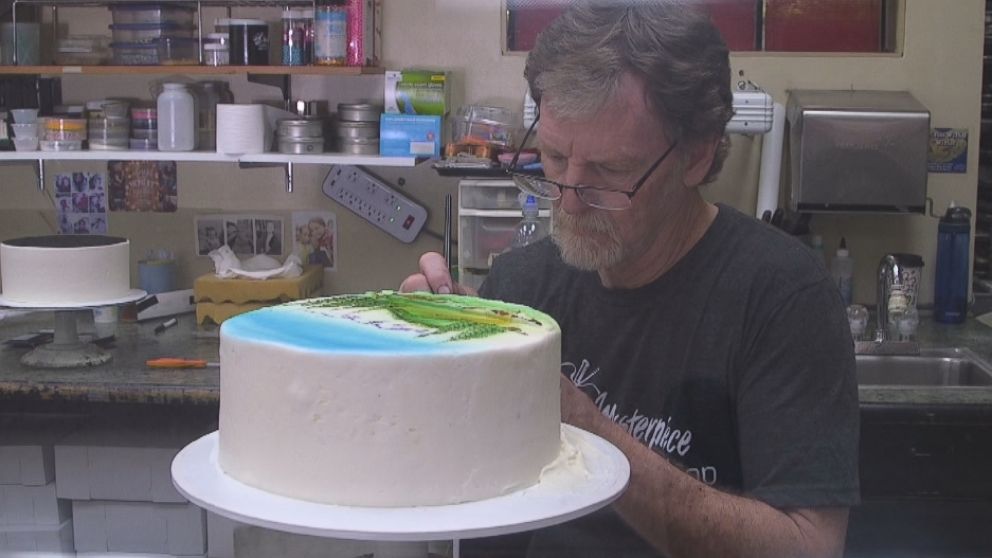How a same-sex wedding cake controversy made it all the way to the Supreme Court
Jack Phillips said he’s not just a baker, but also an artist.
"Part of it is icing. Part of it is piping. Part of it is airbrush to create the leaves and the flowers," Phillips told ABC News’ "Nightline" co-anchor Juju Chang in an interview last week. "We paint on cakes, we sculpt cakes, we sketch on cakes."
Phillips, who owns Masterpiece Cakeshop in Lakewood, Colorado, said his Christian faith guides everything in his life -- including his refusal to bake a wedding cake for a gay couple because it would have violated his religious beliefs.
"That cake is that strong of a message in our culture, and marriage in general between a man and a woman across all cultures, religions, is an inherently religious event," Phillips said.
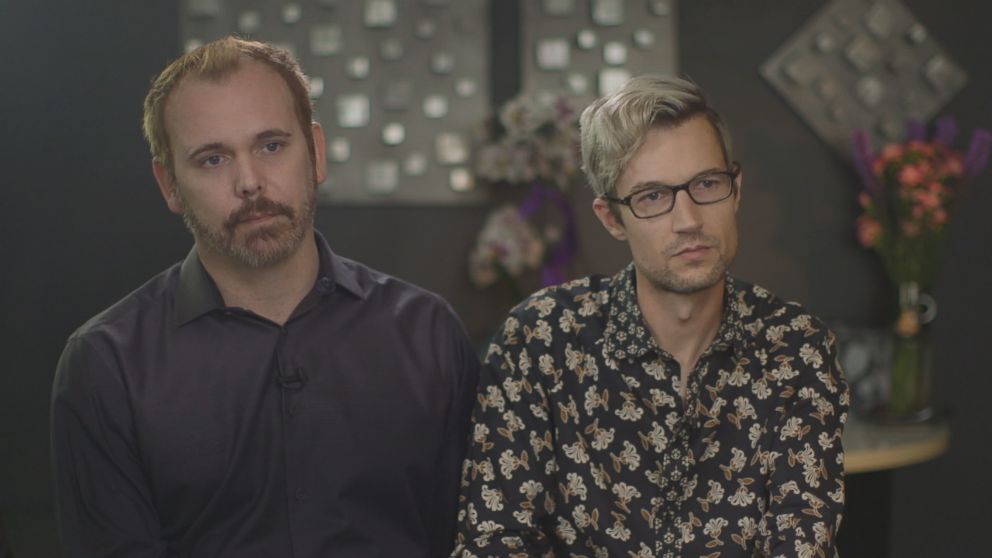
The legal clash between Phillips, who claimed religious liberty, and the same-sex couple for whom he refused to bake a cake, who claimed discrimination, made it all the way to the U.S. Supreme Court. On Monday, the court ruled in Phillips' favor.
It all began when Charles Craig and Dave Mullins walked into Phillips’ shop in 2012 looking for a wedding cake.
"It was a really special day because Charlie’s mom was in town, and she does not live in Denver ... so she was particularly excited," Mullins told "Nightline" in an interview last week.
Mullins said Craig even brought a binder full of ideas and concepts for the cake.
"We never even got a chance to open the binder," Mullins said.
Same-sex marriage wasn't legally recognized in Colorado at the time so the couple had planned to have their wedding in Massachusetts and then celebrate with a reception back home near Denver.
But they would not be serving a cake made by Phillips at the reception.
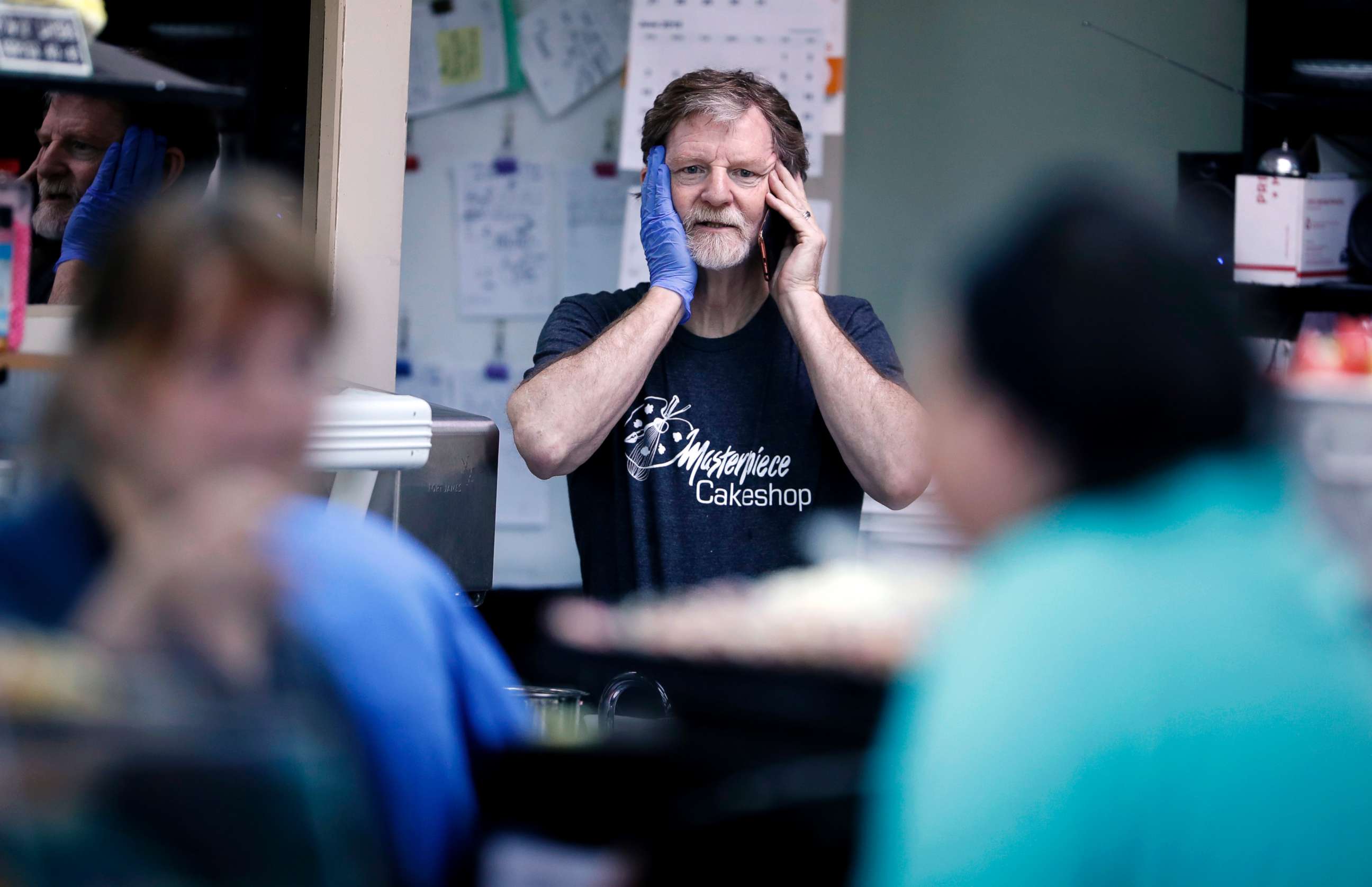
Phillips said that after Craig and Mullins introduced themselves, they told him they were looking for a cake for their wedding.
"I realized right then that this is not a cake that I’m going to be able to design and create for them," Phillips said. "I tried to apologize to them, say, you know, 'I’ll sell you cookies, brownies, birthday cakes, anything else in my store.'"
Phillips said the couple stormed out of his shop.
"We weren't in there for brownies for my birthday," Mullins said. "We were in there because we needed a cake to serve at our reception."
Phillips said he didn’t see his decision as an act of discrimination.
"I see it as an act of following my faith," Phillips said. "It’s not just a cake. It’s an iconic symbol of a wedding."
He continued, "This is a religious ceremony that goes in direct conflict with my faith."
Craig said the exchange didn't fully sink in for him until they got back to the car.
"When I realized exactly what had happened, in the car, I broke down and started crying," he said.
"I was mortified," Mullins said. "Neither of us had ever been treated this way before at a business."
Dejected and furious, the couple posted about their experience on Facebook.
"We wrote just a small modest post that said, 'Hey, we were discriminated against at this cake shop,'" said Craig.
The post went viral.
"We received this outpouring of support from people not just in Colorado, but from literally around the world," Mullins said.
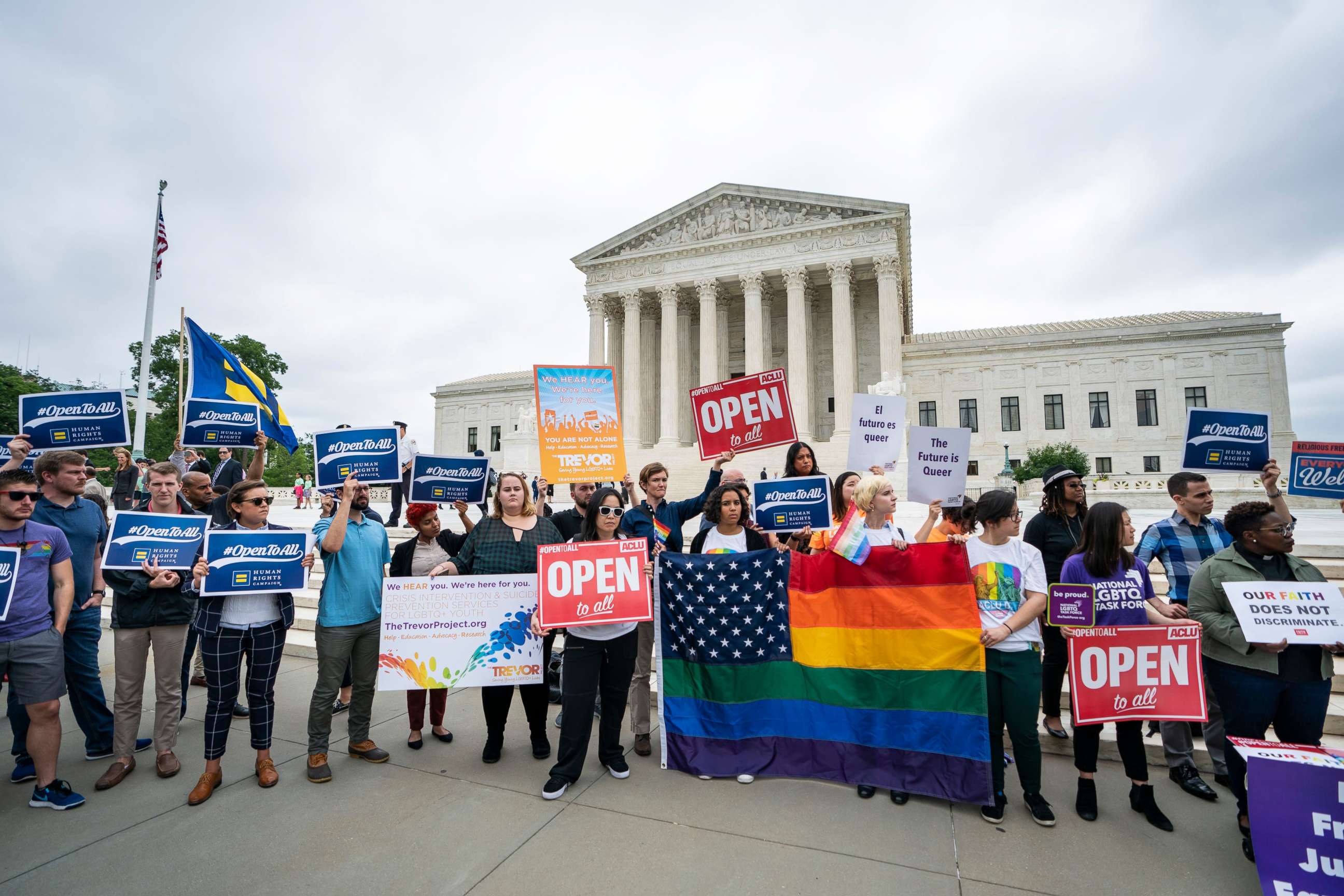
Encouraged by the public response, the couple then filed a complaint with the Colorado Civil Rights Commission. Colorado is one of 21 states that prohibits discrimination based on sexual orientation.
Phillips argued that his refusal had nothing to do with hate.
"This is about not creating a message and a government forcing me to," Phillips said. "I serve everybody who comes in my store. I just don’t create ... every cake that people ask me to create."
The commission ruled in the couple's favor, describing the use of religious beliefs as a reason for what they called discrimination as "one of the most despicable pieces of rhetoric." That decision was later upheld by the Colorado Court of Appeals, as well.
"It made us feel like we were valued members of our community," Mullins said.
As part of the ruling, the commission ordered Phillips to retrain his employees and serve everyone wedding cakes, regardless of sexual orientation.
But Phillips refused and stopped making wedding cakes altogether. His refusal, he said, cost him 40 percent of his business.
"We’ve had death threats, we’ve had emails, phone calls," Phillips said. "Our lives have been turned upside down."
Aided by the Alliance Defending Freedom, a Christian advocacy organization, Phillips petitioned the Supreme Court to take his case, saying the state of Colorado violated his First Amendment rights of freedom of religion and expression.
"What we're asking the Court to look at is creative professionals, should they be forced to violate the First Amendment, our deeply-held religious beliefs, to create art that violates those beliefs. Which is more important?" he said before the court’s decision. "What I do, I paint on cakes. I sculpt cakes. It's clearly art. It's clearly protected."
Phillips said he couldn’t just create a generic wedding cake available to any customer.
"That would be side-stepping the issue. That’s still the government forcing me to create cakes for ceremonies that go against my faith," Phillips said.
Mullins said he felt the issue was about whether he and Craig were treated differently based on sexual orientation.
"This isn’t about a cake," Mullins said. "It’s about the right of the people to receive equal service at a place of business that anyone else would."
The news that the Supreme Court would take up the case was a shock to many people involved. In December, almost five years after the initial encounter at the Masterpiece Cake Shop, the Supreme Court heard oral arguments in the case.
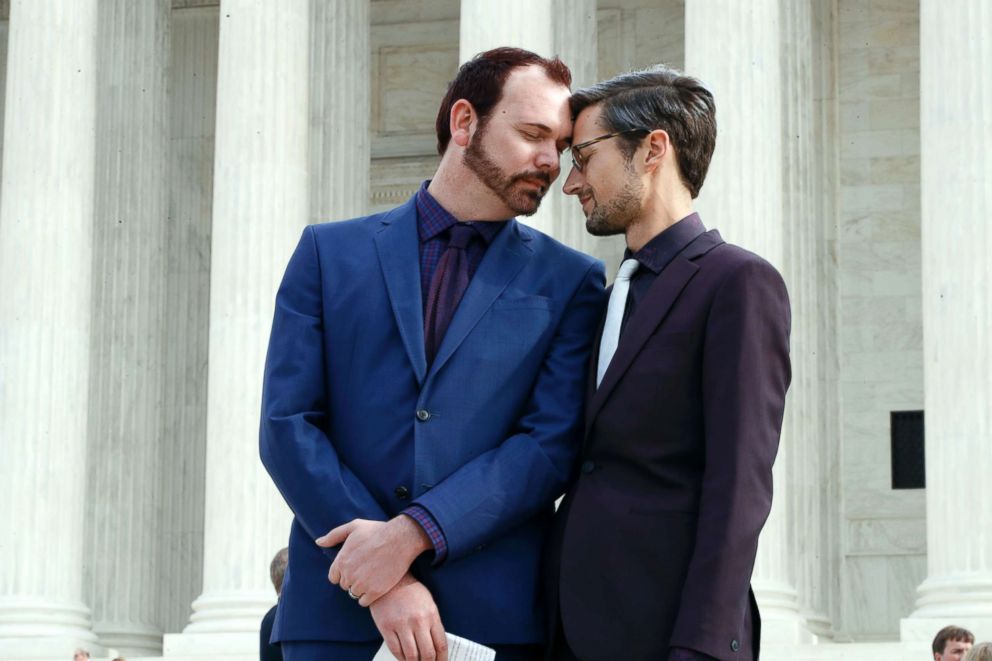
In the opinion issued Monday by Justice Anthony Kennedy, the court affirmed gay rights but disagreed with a Colorado court's previous ruling that Craig and Mullins had been discriminated against based on sexual orientation. The court ruled in favor of the baker with a 7-2 decision, saying that Phillips was the one who was the subject of bias, against his religious beliefs. Only Justices Ruth Bader Ginsburg and Sonia Sotomayor dissented.
The couple said they were blindsided by the decision.
"The first emotions were just shock and disappointment," Mullins told ABC’s Denver affiliate KMGH.
"The bakery may have won the battle, but it has certainly lost the war," said Ria Tabacco Mar, a senior staff attorney for the American Civil Liberties Union (ACLU). "The court really recognized today that deep harms of discrimination and those harm apply equally to LGBT people."
Neither Mullins, Craig nor Phillips agreed to speak with "Nightline" again after the ruling. But before the decision, Phillips told "Nightline" in Denver last week that he would be "overjoyed" if it came down in his favor.
"Hopefully it would send a message that every American, every creative professional has the right to live and work according to their freedom, according to their convictions, and create the works of art that they love without fear of punishment from the government," he said.
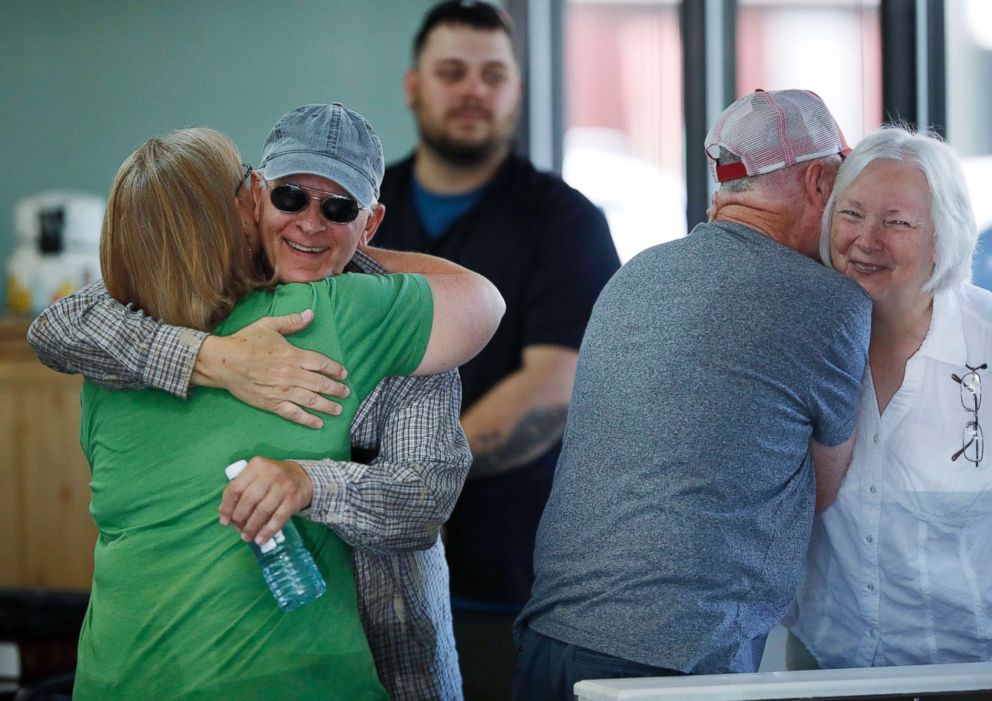
Monday’s ruling was a victory in the eyes of many religious rights activists and celebrations broke out in front of the shop when it was announced. At least four justices affirmed gay rights, but called out the Colorado commission’s language. In regards to the commission's language that described Phillips' use of religious beliefs as a reason for what they called discrimination and "one of the most despicable pieces of rhetoric," Justice Kennedy called it "disrespectful" and "hostile towards his sincere religious beliefs."
LGBTQ groups, including GLADD, worry that this ruling could open the floodgates for bigotry hiding behind religious exemptions.
"There's no question that opponents of LGBT equality will and already have seized on today's opinion as standing for far more than it does," said Mar. "This case was never about cake. And we know our opposition won't stop."
But for Mullins and Craig, the fight for equal rights is far from over.
"The struggle is real and, you know, civil rights aren’t gained overnight," Mullins told KMGH. "We hope we raised awareness, not just in Colorado, but across the country about how this form of discrimination affects LGBT people across the country every day."
